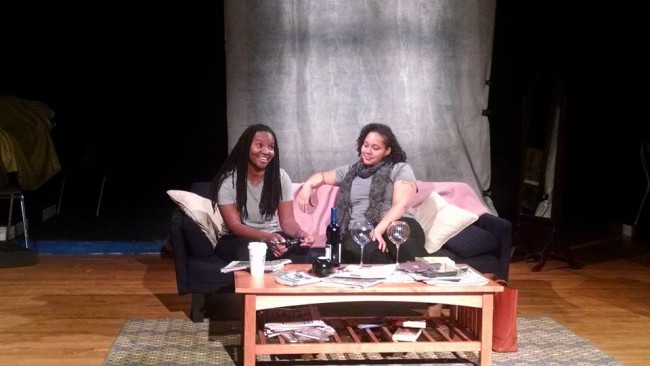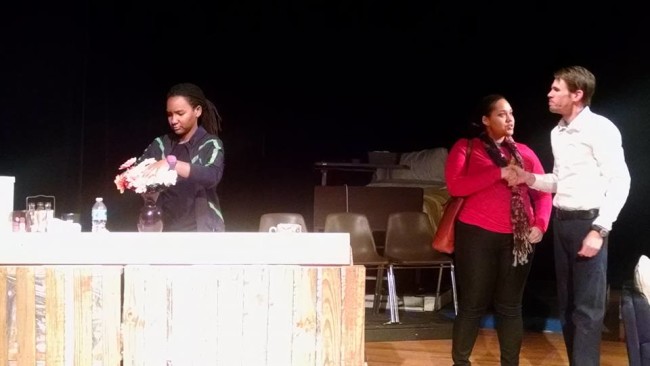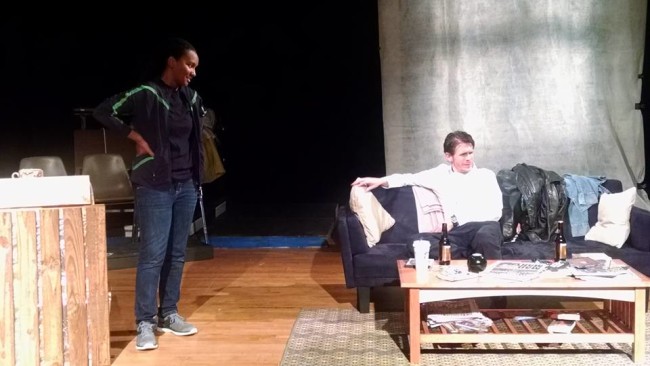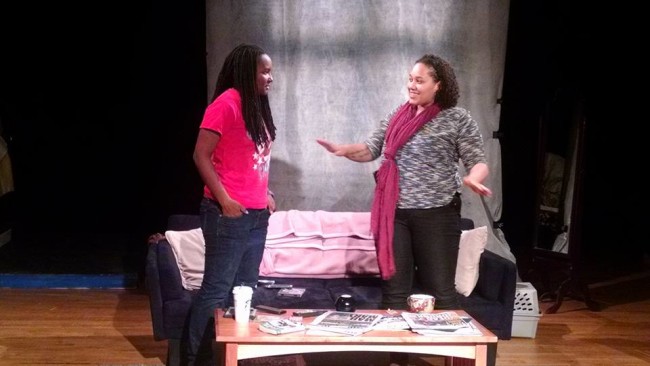A moment can change your life forever. You go from being the blueberry muffin lady to the lesbian traffic reporter whose girlfriend got beaten into a coma. The powerfully evocative drama Stop Kiss comes to the stages of How Do You Like Me Now? Productions as their second official production since their inception a year ago. Directed by company Co-Founder Ed Higgins, the work is a remarkably astute encapsulation of the company’s mission statement to draw awareness to bullying and erase hate through art.

Setting up in the black box space of the Howard County Center for the Arts, Director Ed Higgins takes a uniquely inclusive approach to the show’s scenic design. Priming the experience to immerse the audience by having them enter the house through Callie’s apartment door, Higgins prepares theatergoers to be an active observing part of the evening’s performance. It’s his use of spatial relationships and overall absent space demarcations that make the set exquisite in its existence. All of the scenes— Callie’s apartment, the hospital room, the café, the detective station— all exist in their own bubble of space, separated by gaps in the flooring to give them their own moment in the play’s existence.
The reason Higgins’ fully articulated floor plan of mass-scene execution works so well is because of Lighting Designer Julia Junger. Utilizing a simplistic light plot, Junger isolates each of the scenic areas to further the delineation of which space is which. Full warm indoor ambience lights are used for the front of the stage where the bulk of the show occurs in Callie’s apartment. More subdued orange and amber lights draw focus to the scenes in the background and periphery, like that of the hospital room and the detective’s interrogation. Junger and Higgins fabricate a sacred moment of safety and joy in their creation of the park-bench scene, which remains mostly hidden by a scrim center stage until it is lit in the delicate blues of pre-dawn twilight once it happens. These concise articulations of space allow for ease of transition from one scene to the next in an otherwise limited playing space.

Higgins’ attention to detail throughout his scenic work and overall directorial approach to the show is astounding. From the actual coffee being brewed on stage to the thoroughly lived-in apartment décor, there is an authentic verve of reality that penetrates the production on the whole, making it relatable and believable to the audience. These nuances are furthered in Higgins’ directorial style, allowing little moments to exist naturally and become the bigger moments upon which the audience will reflect as the course of the evening goes on.
The performance, despite some minor pacing delays, is a strong one. The message that playwright Diana Son layers soundly into her words radiates through with Higgins’ casting choices as well as a particularly harrowing silent cameo featured at the end of the production. There is much to be said for the cast’s overall dedication to performing the sort of work that will generate an honest conversation about bullying in the LGBT+ community, and there is great pride in the success of that work which is displayed upon the stage.

Though George (John Gurtshaw) and Peter (Louie Silverio) fall to the back burner as far as characters go in this play, both Gurtshaw and Silverio have moments that pop right off the page and stick hard to the minds of those watching. Silverio has only two scenes in which he appears, but his initial confrontation with the character of Callie is delivered with unimaginable anger steeped in deeply wounded pride and fear. His shouting accusations are revolting to endure, which is the exact sentiment intended for that moment. Gurtshaw has a few more scenes in which to lay down his stereotypical uncouth New York male behavior. Crass and sharp-witted, Gurtshaw delivers an equally engaging side character, even finding depth in the otherwise shallow construct of George. His scene where his true colors of defensive friend shine through as he berates Callie for making him worry is a pivotal moment in his character’s otherwise limited track of growth.
The Nurse (Kay Sweitzer) and Mrs. Winslow (Anne Hull), much like George and Peter, barely appear in the play except for to serve the functional purpose of plot advancement. Though Sweitzer’s dialogue and existence is the least exposed, her stage presence is impressive; she delivers a tender hand with a well-informed sense of how to be professional as a nurse caring for a patient who is the center of a controversial issue. Hull delivers sarcastic quips as Mrs. Winslow and banters particularly well with Detective Cole (Ed Higgins.) Their interrogation scenes are quite terse and their interactions are traded back and forth as the most up-tempo bickering in the performance. Higgins, who wears many hats for the production, is a fine character actor who hones in on the slightly homophobic tendencies of the detective, working and wheedling them to sound acceptable, especially when addressing Callie.

The core of the show is shouldered on Callie (Kandice Wilson) and Sarah (Asia Kenney.) Their relationship, which starts as innocuous meeting of strangers, grows into something beautiful, progressively shifting into full bloom with each forward-moving scene. The deliberate pauses of awkwardness carefully crafted between them during the “getting-to-know-you” phase are moments of giddy delight for anyone who has ever found themselves in a similar situation.
Kenney takes to Sarah with gusto, living in the moments when she’s more comfortable with Callie. The same is said of Wilson and her approach to Callie. The two play well off each other and know how to read one another, being more physically and emotionally open to one another as the scene progress. There is a fondness of friendship that underscores their development in this vein and their willingness to live in each moment of the show is keenly felt.
An exceptional play with a solid message being produced by a company with a true and passionate cause behind their mission, Stop Kiss is worth taking in over the next two weekends for a great number of reasons, but none so important as learning to accept people for who they are.
Running Time: 2 hours with one intermission
Stop Kiss plays through November 1, 2015 at How Do You Like Me Now Productions performing at the Howard County Center for the Arts— 8510 High Ridge Road in Ellicott City, MD. Tickets are available for purchase at the door.
Click here to read the interview with Director and Company Founder Ed Higgins.

